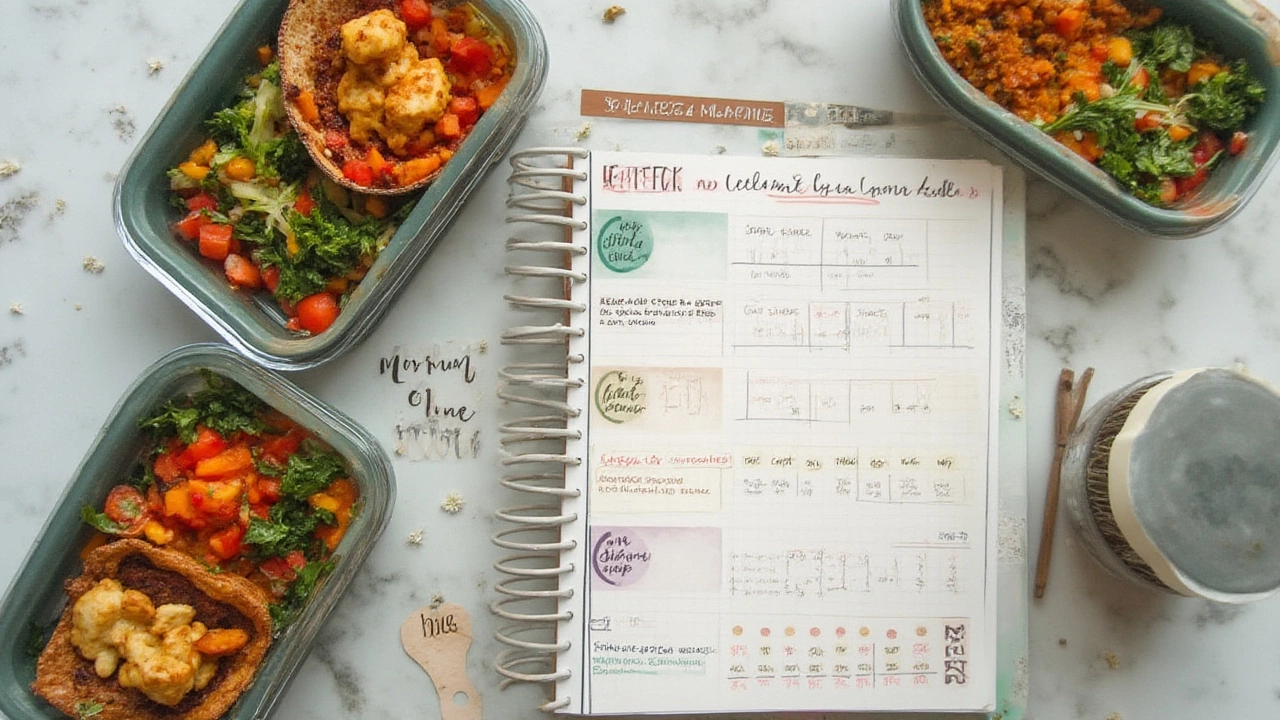How to Lose 5 Pounds Fast: Proven Ways for Quick Weight Loss
 Jul, 5 2025
Jul, 5 2025
Five pounds in seven days. Sounds tempting, right? For lots of us, this isn't about squeezing into a party dress or prepping for vacation—it's about feeling lighter, maybe even feeling back in control. Here’s the truth: while you can drop 5 pounds in a week, most of it will be water weight, but that doesn’t mean it’s pointless. The kick-start you get from a quick loss can be crazy motivating. But it has to be done safely. Forget magic pills or extreme fad diets. There’s a smarter way.
Why Losing 5 Pounds Fast Isn’t Just About Cutting Calories
So many people think weight loss is a simple equation: eat less, move more. But your body isn’t a calculator—and it loves to cling to its energy reserves (aka fat). If you suddenly slash your calories, your metabolism fights right back, slowing things down to protect your precious reserves. That's why those crash diets seem to work in the beginning, but often end with a rebound.
Let’s talk numbers. A pound of fat is roughly 3,500 calories. In theory, dropping 5 pounds in a week means a deficit of 17,500 calories—that’s 2,500 a day. Sounds brutal. But, here’s the thing: our bodies lose water quickly when we reduce carbs and sodium. That’s where real fast changes happen, at least on the scale.
But you don’t want to burn out or make yourself miserable. Science says a mix of strategies—swapping certain foods, bumping up movement, and shifting habits—gets you results you can actually handle. You don’t need to skip meals, either. You want changes that don’t leave you starving.
It isn’t all about what you eat. Hormones matter. Sleep matters. Stress matters. Being dehydrated can even make you hang onto every ounce. And here’s a fun fact: adults can lose as much as three pounds of water weight just by dropping carb intake for a couple of days.
Now, don’t mistake fast weight loss for permanent fat loss. About 60-70% of what you drop fast is water, according to a 2023 research review in the British Journal of Nutrition. The rest comes from glycogen (carb stores) and, to a much lesser degree, fat. But giving your body a "reset" can spark a longer weight loss streak.
Getting there without feeling run down means being clever about your everyday choices—not just starving yourself. You won’t need to eat like a rabbit, ignore your hunger, or run a marathon either. But you will need to make short-term tweaks to shake things up.

The Exact Steps to Drop 5 Pounds (No Starvation Required)
Here’s where the rubber meets the road. Forget what you see on TikTok—there’s no single magic hack. It’s a combination play. The best way? Lower your carb and sodium intake, up your water, ramp up your movement, and get consistent sleep. Let’s break down each step so there’s no guessing.
- Lower Carbohydrates: Not saying go zero-carb, but swap refined carbs (like white bread and pastries) for fiber-rich veggies and some whole grains. Carbs pull water into your muscles; lose them and you lose water weight. Try a week avoiding pasta, bagels, crackers, and go heavy on greens, peppers, and cauliflower.
- Cut Sodium: The American Heart Association says Americans average 3,400 mg sodium per day, while the recommendation is less than 2,300 mg. Extra salt means extra water retention. Steer clear of processed foods, canned soups, frozen dinners, and soy sauce. Cook at home and flavor with herbs, lemon juice, or garlic instead.
- Drink More Water: Sounds weird, but yes, drinking water actually makes you shed water. Aim for at least 80-100 ounces a day. Bring a refillable water bottle everywhere. Every time you want a snack, try water first. Your body sometimes confuses thirst for hunger.
- Move Daily—More Than Usual: Bumping up movement burns calories and also sweats out extra water. Try brisk walking for an hour each day, or stack in short workouts (like two 30-minute sessions if that feels more doable). HIIT routines, cycling, and even fast power walks work well.
- Prioritize Sleep: The National Sleep Foundation says adults who clock 7-9 hours per night regulate hunger hormones better. Short yourself on rest, and your body boosts ghrelin (your hunger hormone). So set a bedtime, wind down early, and put your phone on "do not disturb."
- Manage Stress: Stress triggers cortisol, which can make your belly hold onto fat and bloat. Take walks, try journaling, or just blast your favorite playlist. Make relaxation part of your routine, even if for just 10 minutes.
- Skip Alcohol: Booze is calorie-dense, but also dehydrates, making you retain even more water. Replace that nightly glass of wine with sparkling water and a squeeze of lime just for this week. Your liver will thank you.
You’re not creating a prison here—just hitting a reset for a week. Pack your meals with lean proteins (chicken breast, fish, tofu), lots of steamed or roasted veggies, and a handful of berries for sweetness. If you need a snack, think raw carrots or a boiled egg.
Here’s what a typical meal plan might look like in this one-week sprint:
| Meal | Example Food |
|---|---|
| Breakfast | Egg white omelet, spinach, tomatoes, small apple |
| Lunch | Grilled chicken breast, large salad (greens, cucumber, tomato), olive oil & vinegar |
| Snack | Raw almonds, carrot sticks |
| Dinner | Baked salmon, steamed broccoli, roasted zucchini |
If you eat out, avoid anything fried or sauced, ask for dressings on the side, and skip the bread basket.
And yes—it’s okay to feel a little hungry at first while your body adjusts. Sip water or hot unsweetened tea instead of mindlessly snacking.

Staying Motivated and Sticking With It (It’s Not Just Willpower)
Anyone can follow a plan for a day or two. But finishing what you start? That’s where most of us struggle. It’s not really about weak willpower; it’s about knowing your "why" and having ways to stay focused when things get tricky.
Start with real, honest tracking. Write down every bite and sip—no cheating, no rounding down. Use your phone or even a sticky note on the fridge. When you track, you spot patterns: maybe those “just a few chips” after work keep adding up, or your “healthy” salad dressing is packed with sugar.
Get support. Challenge a friend to do it with you, or join a Facebook group for accountability. Buddying up makes it harder to quit (not to mention, way more fun to share progress).
Build tiny rituals—set out your sneakers at night, meal prep every Sunday, or lay out your water bottles on the counter. These actions cue your brain that change is happening.
Watch those numbers on the scale—but don’t fixate. Measure your waist or take a progress selfie. Most people drop the most weight in the first three days, then it slows. If the scale stalls, stick to the plan—bodies fluctuate, especially with hormones, heat, and activity.
Craving sweets? Go for berries or a crisp apple with a sprinkle of cinnamon. Need crunch? Air-popped popcorn or nuts help without wrecking your week. And don’t beat yourself up if you slip—just get back on track the next meal. Consistency always beats perfection.
Read labels when you grocery shop. You’ll be floored at how much added sodium and sugar show up in even "healthy" foods. That probiotic yogurt? Some have more sugar than soda. Pre-made salad kits? Loaded with salty cheese and high-sugar dressings.
If you hate the flavor of plain water, try infusing it with cucumber, lemon, or a couple of frozen berries. Or make it bubbly with a soda machine at home. You want to actually enjoy it, or you’ll never keep drinking enough.
Just remember—it’s not forever. This isn’t a lifestyle overhaul (unless you want it to be!). You’re giving your body a one-week reset. When your week wraps up, celebrate with a fun activity—not food. Go hiking, hit a yoga class, or take yourself shopping. The confidence you’ll get from seeing results? That’s the real payoff.
For some people, quick results become the spark for longer-term changes. Maybe this is that kind of week for you. The scale isn’t the whole story; energy, sleep, and mood count, too. If you feel lighter, more energetic, or just proud, that’s winning. Now, go prove to yourself it’s possible. You’ll be surprised how much a week can change.
